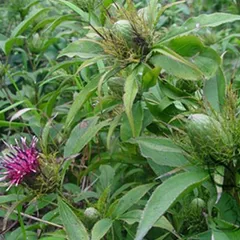Heart and Spleen Deficiency
The information provided here is not a replacement for a doctor. You shouldn't use it for the purpose of self-diagnosing or self-medicating but rather so you can have a more informed discussion with a professional TCM practitioner.
At a glance
Preliminary reading: What is a pattern? The Heart in Chinese Medicine The Spleen in Chinese Medicine The concept of Qi The concept of Blood
Key attributes
Chinese name: 心脾虚 Pinyin name: Xīn Pí Xū
Pattern nature: Empty
Diagnosis
Common symptoms: Fatigue Anxiety Insomnia Pale face Pale lips and eleven other symptoms
Pulse type(s): Choppy (Se), Fine (Xi)
Tongue coating: Thin white coating
Tongue color: Pale
Treatment
Common formulas: Gui Pi Tang
Pathology
The Spleen rules transformation and transportation of food, Qi, and Body Fluids and their distribution to other Zang Organs. It is the origin of Blood production and keeps it running inside the vessels.
The Heart's main function in Chinese Medicine is to govern the flow of Blood, the Blood vessels and to house the Spirit / Mind (Shen - 神).
The Heart can receive sufficient Blood from the Spleen, if the latter's transformation and transportation function work properly, providing sufficient nutrients for growth and development. In turn, Heart Blood circulates and supplies the Spleen with nutrients to better perform its functions.
In the Five Phases theory, the Heart is the Mother of the Spleen. In case of Heart Blood or Qi Deficiency, mental anxiety occurs and it can disturb the Spleen's transforming and transporting functions. Then it results in irregular distribution of nutrients for growth and development. It can also damage the Spleen's ability to keep the Blood flowing within the vessels.
In return, a combination of Heart and Spleen symptoms such as palpitation, insomnia, anorexia, fatigue and pallor can further damage Heart Blood and Spleen Qi or Blood. To treat it, herbs to invigorate the Spleen and nourish the Heart are used, such as Ginseng and Longan Combination (Gui Pi Tang).
Diagnosing Heart and Spleen Deficiency
Diagnosing a pattern in Chinese Medicine is no easy feat and should be left to professional practitioners. In particular one has to know how to differentiate between different types of pulses and tongue coatings, shapes and colors as well as learn to read from a long list of seemingly unrelated symptoms.
Pulse type(s): Choppy (Se) or fine (Xi)
Tongue coating: Thin white coating
Tongue color: Pale
Main symptoms: Fatigue Anxiety Insomnia Pale face Pale lips Dizziness Poor memory Menorrhagia Palpitations Loose stools Poor appetite Forgetfulness Scanty periods Pale complexion Dream disturbed sleep Abnormal uterine bleeding
Treating Heart and Spleen Deficiency
Herbal formulas used to treat Heart and Spleen Deficiency



The top herbs in Gui Pi Tang are Ginseng (Ren Shen), Milkvetch Roots (Huang Qi) and Atractylodes Rhizomes (Bai Zhu)
Gui Pi Tang
Source date: 1529 AD
Number of ingredients: 12 herbs
Key actions: Tonifies and nourish Qi and Blood. Tonifies Heart and Spleen.
Formula summary
Gui Pi Tang is a 12-ingredient Chinese Medicine formula. Invented in 1529 AD, it belongs to the category of formulas that tonify Qi and Blood.
Besides Heart and Spleen Deficiency, Gui Pi Tang is also used to treat Qi Deficiency or Blood Deficiency.
Diet recommendations
Eat a balanced diet including lamb, Dang Gui and ginger soup, bone marrow soup, milk, whole grains, protein, legumes (especially adzuki beans), congee. Eat only cooked foods and room temperature drinks. Avoid raw and cold foods and juices. Do not skip meals.
Related conditions
Please keep in mind that a Western Medicine condition can be caused by several Chinese Medicine patterns of disharmony and vice versa. As such a patient suffering from one of the conditions below will not necessarily be suffering from Heart and Spleen Deficiency, it is just one pattern that's commonly associated with the condition. Click on a condition to learn what other patterns it's associated with.
Peptic ulcers Anemia Perimenopausal syndrome Allergic purpura Congestive heart failure Depression Insomnia Postconcussion headache Nervous exhaustion Myasthenia gravis Colitis Supraventricular tachycardia Cervicitis Anxiety
